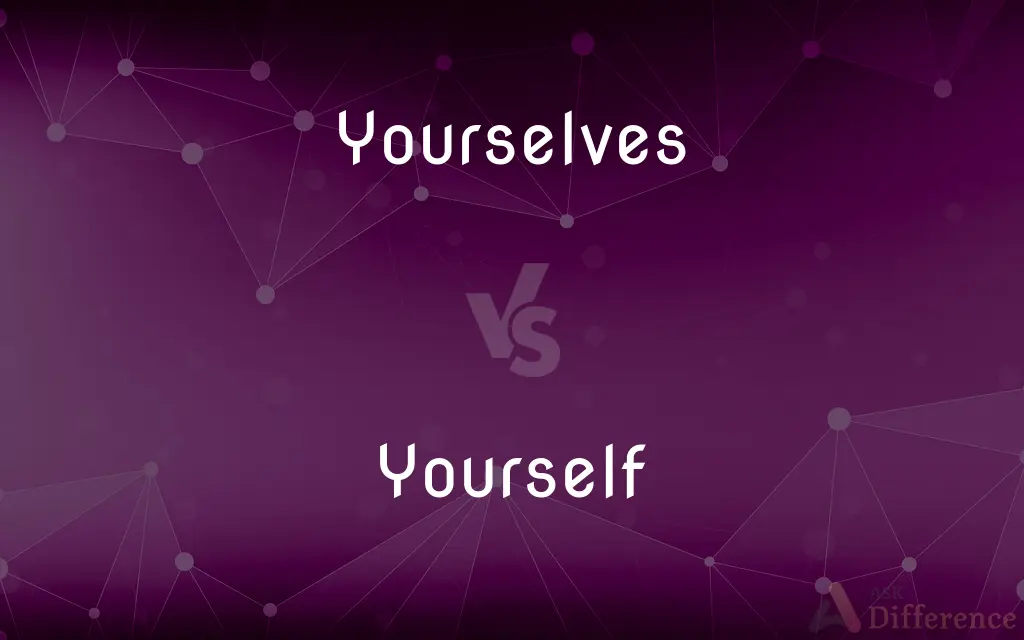Yourselves vs. Yourself — What's the Difference?
By Tayyaba Rehman & Maham Liaqat — Updated on February 26, 2024
"Yourselves" is the plural reflexive pronoun used for two or more subjects, while "yourself" is the singular form used for a single subject, reflecting actions back onto the speaker.

Difference Between Yourselves and Yourself
Table of Contents
ADVERTISEMENT
Key Differences
"Yourself" and "yourselves" are reflexive pronouns used to refer back to the subject of the sentence. "Yourself" is used when the subject is singular, referring to one person. "Yourselves" is used when the subject is plural, referring to more than one person.
The sentence "You see yourself in the mirror," "yourself" reflects the action back onto the speaker. And the sentence "You all prepared yourselves for the journey," "yourselves" refers back to the group being spoken to.
The choice between "yourself" and "yourselves" depends on the number of subjects involved. This distinction is crucial for clarity in communication, ensuring that the speaker's intent is accurately conveyed.
The distinction between singular and plural is important, such as in instructions or advice, using the correct form of the reflexive pronoun enhances understanding. For instance, "Check yourself before you leave" versus "Check yourselves before you leave" clearly differentiates between advice for one person or a group.
Comparison Chart
Number
Singular
Plural
ADVERTISEMENT
Usage
Refers back to the subject when it's one person.
Refers back to the subject when it's more than one person.
Example Sentence
"You should take care of yourself."
"You should take care of yourselves."
Function
Reflects the action of the verb back onto the speaker.
Reflects the action of the verb back onto the group being addressed.
Context
Personal advice, self-reflection.
Group advice, collective activities.
Compare with Definitions
Yourselves
Reflexive pronoun for plural "you," referring to a group.
Save yourselves some time.
Yourself
Reflexive pronoun for singular "you," indicating the person spoken to.
Treat yourself to a day off.
Yourselves
Used for emphasis when addressing a group.
You yourselves are responsible.
Yourself
In instructions to one person.
Protect yourself at all times.
Yourselves
In instructions to more than one person.
Prepare yourselves for the exam.
Yourself
Emphasizing the identity of the subject "you."
You have to believe in yourself.
Yourselves
For group reflection or actions.
Ask yourselves what you want.
Yourself
Used for emphasis to single "you."
You yourself can decide.
Yourselves
Emphasizing the identity of a group.
You must all decide for yourselves.
Yourself
For self-reflection or actions affecting the speaker.
Ask yourself why.
Yourselves
(reflexive pronoun) Inflection of you (plural) used as the object of a verb or non-locative preposition in a clause whose subject is the same (the people addressed).
You shouldn't blame yourselves.
Talk amongst yourselves.
Yourself
You personally (used to emphasize the person being addressed)
You're going to have to do it yourself
Yourselves
(emphatic) You (plural), used to intensify the subject as the group addressed.
You yourselves won’t eat at that restaurant. Why are you recommending it to us?
Yourself
You (singular); used emphatically, especially to indicate exclusiveness of the referent's participation in the predicate, i.e., that no one else is involved.
You yourself know that what you wrote was wrong.
After a good night's sleep you'll feel like yourself again.
Common Curiosities
Can "yourself" and "yourselves" be used interchangeably?
No, their use depends on whether you are referring to one person or a group.
What is the difference between "yourself" and "yourselves"?
"Yourself" is used for a single person, while "yourselves" is used for multiple people.
How do I know when to use "yourself" or "yourselves"?
Use "yourself" when addressing one person and "yourselves" when addressing more than one.
Are "yourself" and "yourselves" only used for reflection?
Primarily, yes, but they can also be used for emphasis or in idiomatic expressions.
What is the plural form of "yourself"?
The plural form of "yourself" is "yourselves."
Can "yourself" be used to give advice?
Yes, "yourself" can be used when giving advice to one person.
Why are "yourself" and "yourselves" important in English?
They are crucial for clarity in communication, indicating whether one is referring to an individual or a group.
Is it correct to say "you all have to do it yourselves"?
Yes, this correctly uses "yourselves" to refer to a group being addressed.
In what context might "yourself" be incorrectly used for a group?
Using "yourself" for a group is incorrect; "yourselves" should be used instead.
Can "yourself" be used for emphasis?
Yes, "yourself" can emphasize the subject "you" in a sentence.
Is "yourself" appropriate in formal writing?
Yes, when correctly used to refer to a single person, "yourself" is appropriate in formal writing.
How do reflexive pronouns like "yourself" and "yourselves" enhance sentences?
They provide clarity on who is affected by the action, enhancing comprehension and specificity.
What is an example of using "yourselves" in a sentence?
"Make yourselves at home" is an example where "yourselves" refers to a group.
Can "yourselves" be used when talking to one person who represents a group?
Typically, "yourselves" is used when directly addressing the group, not a representative.
Are there any exceptions to using "yourself" and "yourselves"?
Generally, the rules are consistent, but exceptions may arise in idiomatic expressions or for stylistic reasons.
Share Your Discovery

Previous Comparison
Fish vs. Seafood
Next Comparison
Underprivileged vs. UnprivilegedAuthor Spotlight
Written by
Tayyaba RehmanTayyaba Rehman is a distinguished writer, currently serving as a primary contributor to askdifference.com. As a researcher in semantics and etymology, Tayyaba's passion for the complexity of languages and their distinctions has found a perfect home on the platform. Tayyaba delves into the intricacies of language, distinguishing between commonly confused words and phrases, thereby providing clarity for readers worldwide.
Co-written by
Maham Liaqat















































